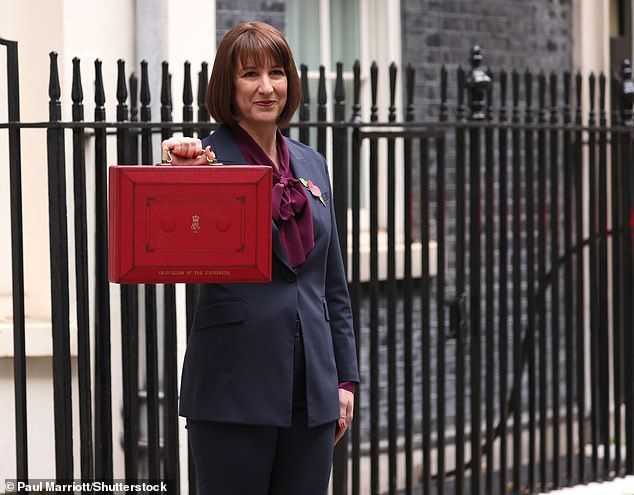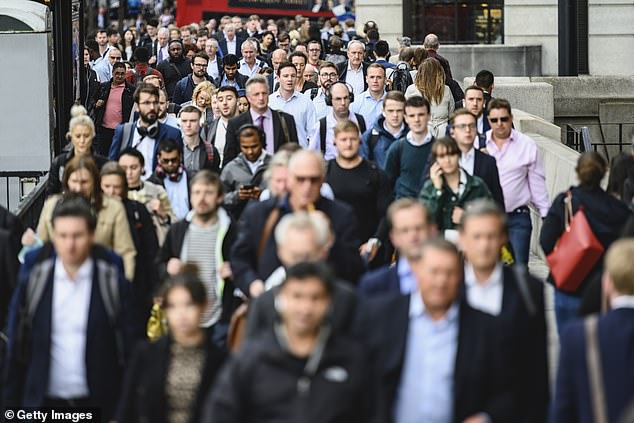It is destined go down in history as the most destructive British tax increase of modern times – a £25 billion hit to our economy when it is in no condition to withstand it.
In fact, the timing could not be worse.
Employers will start paying the massive increase in National Insurance contributions (NICs) Rachel Reeves announced in last October’s Budget from tomorrow.
The rise comes in just as the UK economy is already sinking under the weight of the Chancellor’s own dead hand on the tiller and the global economy is thrown into chaos by Donald Trump’s ruinous obsession with tariffs, which will further undermine our own economy.
Never has a major increase in tax been launched in such a welter of lies and disinformation. During last summer’s election campaign, Labour assured us that it was precisely the sort of big tax rise it would not inflict. Keir Starmer and his motley crew regularly insisted its spending plans were fully costed and did not require a major tax hike.
Once safely ensconced in the Treasury, Reeves justified it on the spurious grounds that she’d suddenly discovered a hitherto unknown £22 billion ‘black hole’ in the public accounts.
This was a shortfall nobody else could see, however, including the Office for Budget Responsibility (OBR), the official number-crunchers, which refused to endorse the validity of her ‘discovery’.
Even if Reeves’s black hole had been real rather than imaginary, it would not have explained why a £22 billion deficiency required £40 billion of tax rises and spending cuts (of which the increase in NICs was the biggest chunk) to fill it in. The truth is that NICs were being raised not to restore sanity to the public finances but to reward key elements of the Labour tribe now it was back in power – most notably, public sector workers and the NHS.
Then came the sleight of hand. Yes, before the election Labour had ruled out a rise in NICs (along with income tax and VAT). But, ministers insisted with a straight face, it had not specifically excluded NICs paid by employers, which meant it wasn’t a tax on ‘working people’ – the bosses would pay.

Even if Reeves’s black hole had been real rather than imaginary, it would not have explained why a £22 billion deficiency required £40billion of tax rises and spending cuts to fill it in
The dissembling was a disgrace. Even an economist of Reeves’s insignificant experience and mediocre achievements should have known that a rise in employer NICs is, in the end, paid for by working people in the form of fewer jobs and lower wages.
It is the accepted economic consensus. All she had to do was ask the OBR, which calculated 75 per cent of the £25 billion cost would be passed on to workers in lower wages alone. Even worse, it quickly became clear the burden would fall most on those least able to bear it.
‘This is the biggest regressive tax change I’ve seen in 30 years,’ says Kate Nicholls, chief executive of UK Hospitality, the trade group whose members own over 130,000 venues, from pubs and clubs to restaurants and hotels. By which she means lower-paid, temporary and part-time workers are bearing the brunt.
This is because Reeves has not only raised the rate of employer NICs from 13.8 per cent to 15 per cent, which is bad enough, she has made it bite much further down the income scale. NICs for employers will now click in when a worker earns over £5,000 a year instead of the current £9,100.
It is this change that really adds to the cost of employing the lower paid and explains why fewer will be hired, more will be fired and those still in a job will see their pay stagnate. So much for Labour’s oft-repeated concern for working people and those on modest incomes.
The rise in NICs is especially invidious because it is being accompanied by another big increase in the minimum wage (which, after a 10 per cent increase last year, rose another 6.7 per cent on Tuesday to £12.21 an hour) and a reduction in business rate relief. Taking all three together adds £3.5 billion a year to the costs of the hospitality sector and £5.6 billion to the costs of high-street retailers.
These extra costs combined, says UK Hospitality, are having a ‘chilling effect on investment plans and job creation’. Since the hospitality and retail sectors rely heavily on lower-paid, part-time and temporary workers, they are the ones naturally in line to suffer the most.
Better-paid workers will see job losses, lower wage growth and perhaps even pay cuts. But you can’t cut the pay of minimum- wage workers and stay on the right side of the law. So they’ll take it on the chin in terms of lost jobs.
The retail and hospitality sectors are already firing more and hiring less. Work for part-timers and temps is harder to come by. Job vacancies in hospitality and retail are collapsing. Unemployment among the young, who depend on both sectors for entry-level jobs, is rising sharply: almost one million 16- to 24-year-olds are not in employment, education or training, the highest level for a decade.

Economists had warned that most of her £25 billion raid on employer National Insurance would be passed on to workers through lower wages
It is not exactly the buoyant, progressive economy Starmer and Reeves were elected to create. The Left-leaning Resolution Foundation, not unfriendly to Labour, calculates the rise in NICs will cost 85,000 jobs, mainly low-paid, and will drive up the cost of part-time, lower-paid employment by 14 per cent, the biggest on record. It agrees that those above the minimum wage can expect lower pay rises.
Yet worse is to come. Angela Rayner’s pro-union workplace reforms are coming down the pike, adding (according to the Government’s own estimates) another £5 billion to the cost of doing business in Britain.
When the history of this Government is written its wilful destruction of what was one of the world’s most successful labour markets, under Conservative and Labour administrations for more than 30 years, will be identified as perhaps its most egregious legacy.
Consumers are suffering too. The British Retail Consortium reckons ‘inflation will accelerate in the coming months’ thanks to the increase in NICs and other government policies pushing up costs. The prices of food and energy, which households have no choice but to buy, are rising fast again.
The British Chambers of Commerce says ‘firms are sitting on a powder keg of costs’, most of which will be passed on to customers, keeping inflation well above its 2 per cent target into next year, undermining consumer confidence and making it harder for the Bank of England to cut interest rates.
In truth, the economy has never recovered from Reeves’s appalling October Budget. She inherited one of the fastest-growing economies in the G7 group of major market economies and knocked the stuffing out of it. Her Spring Statement last month did nothing to rectify matters.
Until this week, the consensus of official and unofficial forecasters was that we’d be lucky to grow by 1 per cent this year. That was before Trump’s tariff tantrum. Britain might have escaped its worst excesses but, as an open, trading economy, we will not avoid the global slowdown it is almost certain to provoke.
As protectionist walls, higher than anything we’ve ever seen before, are erected across the globe, we risk being overwhelmed by a recessionary shock emanating from America and the European Union, our two biggest markets. In that case, there will soon be no growth at all. A serious contraction would be more likely.
The National Institute of Economic and Social Research says Britain faces the prospect of very little growth this year, no growth next year and the ‘huge risk’ of a recession. The Chancellor seems determined to make such dire predictions come true by proceeding with tomorrow’s rise in NICs, the most ill-conceived, self-harming tax rise in living memory.
The OBR said last week that it was already seeing less hiring and more redundancies as a result. The regional offices of the Bank of England are now reporting that numerous employers are freezing their hiring plans and looking to shed labour.
Things can only get worse as Britain squares up to its fate: a dud economy in the hands of a dud Chancellor.







